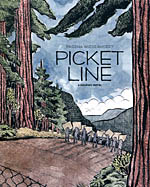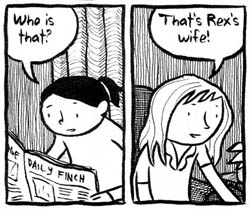 By Breena Wiederhoeft
By Breena Wiederhoeft
272 pages, black and white
Published by Easel Ain’t Easy
A 272-page graphic novel isn’t going to be written and drawn overnight, so it’s all the more impressive when you think about how timely Breena Wiederhoeft’s Picket Line is. With a young woman struggling to find a job, her place in the world, and figure out at what point working for a large company isn’t worth the financial security, it’s a book that hits a lot of the ideas currently gaining national traction on the news. And while there are some peculiar portions of the plot, Picket Line is ultimately a satisfying book that might not have a lot of answers for its readers, but will ask a lot of questions.
The book starts simply enough; Beatrice has moved from Wisconsin to northern California, but now that she’s there, money is rapidly growing short and no job prospects are on the horizon. What first looks like a "this or nothing" job at a lawnscaper starts to turn into a definite career, but then everything is thrown for a loop when they take a contract with a local developer who’s going to turn land originally intended for park land into housing and businesses. It’s presented by Rex (the owner of the company) as a chance to try and save the land from within, but with protestors lining their path to and from the site, Beatrice finds herself wondering if she made the right decision.
 Wiederhoeft divides Picket Line into two halves, and the big shift in the story that separates the pieces comes at just the right time. Without it, I’m not convinced the story would have enough meat to carry it all the way through, but Wiederhoeft provides a balanced look at the two different sides of how to stop development. In doing so, Wiederhoeft does set up the developer himself as a bit too much of a villain to take seriously at times, but sadly none of it is behavior that is out of the ordinary in this day and age. More importantly, though, it lets us watch Beatrice grow as a person; the job she takes at the end of Picket Line is one that comes from a different place and reasoning than the opening chapter, and her maturing and understanding of herself is one of the most believable parts of the book.
Wiederhoeft divides Picket Line into two halves, and the big shift in the story that separates the pieces comes at just the right time. Without it, I’m not convinced the story would have enough meat to carry it all the way through, but Wiederhoeft provides a balanced look at the two different sides of how to stop development. In doing so, Wiederhoeft does set up the developer himself as a bit too much of a villain to take seriously at times, but sadly none of it is behavior that is out of the ordinary in this day and age. More importantly, though, it lets us watch Beatrice grow as a person; the job she takes at the end of Picket Line is one that comes from a different place and reasoning than the opening chapter, and her maturing and understanding of herself is one of the most believable parts of the book.
Some of the supporting cast is a little hard to swallow at times, though, and not just the evil developer. Neither Rex nor his wife Vivian feel quite like they’re in sync with the rest of the book. Rex’s stunted arms are introduced at the beginning as a way for Beatrice to meet him, and to use the visual of the T. Rex subbed out for him at times, but beyond that it feels like strangeness for the sake of strangeness. Early on Wiederhoeft draws a lot of attention to them and how he has a device for his steering wheel and rigged up his office accordingly, but after that it’s dropped and not really referred to again. I understand that over time his deformity would no longer be noticed by Beatrice, but it feels like a strange character hook to introduce early on and then abandon. Vivian the actress barely fits into the book at all; she comes across like someone who wandered in from a completely different graphic novel. The glamorous actress who may be cheating on her husband might work in a book set in Los Angeles or New York City, but here she’s out of place without Wiederhoeft giving us the impression that she’s supposed to be.
Fortunately, the other characters are a bit better. Rex’s daughter Liz and her husband Derek are a bit of a cliche at times, but both move well through the story. Likewise, the protestors and Beatrice’s landlady Sara don’t get developed terribly much, but they’ve got important roles in the story, and there’s a certain warmth to them that makes them likable even when they’re on the opposite side. Most interesting was Beatrice’s love interest Thomas; he comes across as someone who, like Beatrice, is still finding himself. Since the book is from Beatrice’s viewpoint, though, we never get quite a full grasp on his character, which I appreciated. I can’t help but feel like if Wiederhoeft ever wanted to tell his story, there’s another book in that as well.
 One thing I adored from start to finish in Picket Line was Wiederhoeft’s art. At a glance it’s a simple style, with dots for eyes, a single line for a nose, and the outline of hair. But it’s beautifully expressive in how the people move across the page, and there are times when her drawing Rex as a T. Rex manages to be both powerful and pathetic at the same time, a perfect combination for those moments. The park lands also come to life here; the times that Wiederhoeft lets us see the controversial area, she does so by allowing us to drink in its surroundings, from the large trees to the mountains with their carefully shaded lines to give them texture. It helps give you a feel for just what everyone’s fighting over, and why it’s so important.
One thing I adored from start to finish in Picket Line was Wiederhoeft’s art. At a glance it’s a simple style, with dots for eyes, a single line for a nose, and the outline of hair. But it’s beautifully expressive in how the people move across the page, and there are times when her drawing Rex as a T. Rex manages to be both powerful and pathetic at the same time, a perfect combination for those moments. The park lands also come to life here; the times that Wiederhoeft lets us see the controversial area, she does so by allowing us to drink in its surroundings, from the large trees to the mountains with their carefully shaded lines to give them texture. It helps give you a feel for just what everyone’s fighting over, and why it’s so important.
With the Xeric Foundation preparing to close its doors for individual grants, it’s nice to see some of the latest projects to be funded be as enjoyable as Picket Line. It’s a strong debut, and while it’s not perfect it does more than enough things well that I want to see more comics from Wiederhoeft. It’s not only timely, it’s enjoyable, and that’s a rare combination. All in all, a nice job.
Purchase Links: Powell’s Books
